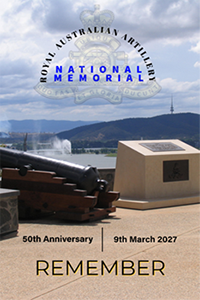The Australian Gunner community, and in particular those in Tasmania, are saddened by the passing of Lieutenant Colonel Michael G. Langley, who had chosen to live in the Tasman Peninsula area of this state. Lieutenant Colonel M.G. Langley MC was a British and Australian (1965-1983) regular artillery officer, his last posting was as Deputy Commander and Chief of Staff 6th Military District and later following his retirement as Colonel Commandant Artillery (Tasmania Defence Region).
In 1967, the then Lieutenant Langley, a Forward Observer for 103 Field Battery with B Company 5 RAR, was awarded the Military Cross as a result of his actions in South Vietnam. The citation outlined below for his Military Cross was taken from Page 482 of ‘The Gunners’ A history of Australian Artillery by David Horner. Published by Allen & Unwin.
‘The close relationship between the infantry and the artillery was exemplified by two incidents during 1967. The first took place on 21 February 1967 when B Company 5 RAR was on operations east of the Long Hai hills (for a description of this operation see O’Neill, Vietnam Task, pp 216-26). The company became caught in an enemy minefield and at least two mines were detonated. The company commander and his company sergeant major, plus one of the platoon commanders and his platoon sergeant, became casualties. Altogether nine died and a further twenty were wounded.
Lieutenant Michael Langley of the 103rd Battery was the FO with the company and was not caught in the explosion. He immediately moved into the minefield, rendered first aid to the injured and arranged their evacuation by helicopter. He then took command of the remnants of the company, organized the local defence of the position and successfully maintained morale and fighting spirit. Mines were a constant threat throughout the operations in Phuoc Tuy Province and the FOs and their parties were at equal risk with the infantrymen.’
Additional Thoughts
Provided by Doug Heazlewood
Secretary 103 Battery Association
I know this news will be particularly difficult for most because of the person Mike was. The epithet of ’one of nature’s gentlemen’ is especially fitting and I have heard it said about my old friend Mike more than anyone else. None of us ever heard a harsh word from him and it was always obvious that he was genuinely pleased to see any of us. I shared a tent with him for about six months and I’ve never met anyone else who was so easy to get along with in every way.
I still wish that I could have taken a leaf out of the Mike Langley book more often. Because Mike was such a good example, I now realise that book is still open.
RAA Liaison Letter 2002 |






